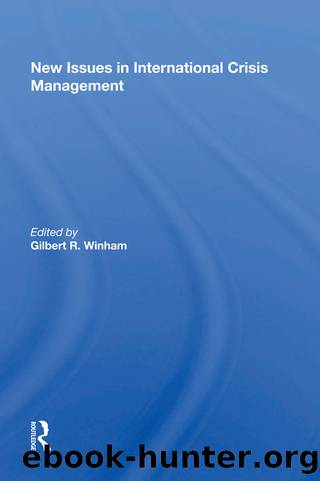New Issues in International Crisis Management by Gilbert R Winham

Author:Gilbert R Winham [Winham, Gilbert R]
Language: eng
Format: epub
ISBN: 9780367011123
Google: LUVqxgEACAAJ
Goodreads: 52235352
Publisher: Routledge
Published: 2019-06-07T00:00:00+00:00
Strategic Alerts in an Era of Essential Equivalence
On three occasions since 1960, the United States has put its global military forces on an increased alert status during a crisis with the Soviet Union. These include the collapse of the summit conference in May 1960, the Cuban Missile crisis in October-November 1962, and the final days of the Middle East War in October 1973 (See Sagan, 1985). Not much comparable information appears to be publicly available regarding the Soviet Union. To date, however, it does seem that the United States and the USSR have not put their worldwide strategic forces on a very high alert at the same time. The basic military purpose of an increase in strategic alert status is to heighten the preparedness for war by taking steps to reduce the time between a subsequent order to use force and the actual initiation of coordinated military action. At least, the United States has demonstrated its willingness to use a heightened alert status as a means of signaling to the other side quickly and dramatically its revolve to protect threatened vital interests. Clearly that was the intent of the American alert during the Yom Kippur War: to signal rapidly that the U.S. would regard the introduction of Soviet troops into Egypt as contrary to U.S. vital interests. (For a discussion of this strategic alert, see Blechman and Hart, 1982; and Kissinger, 1982.)
Whether the Soviet Union's leadership will elect to follow the American precedent and use an increase in strategic alert status as a means of signaling in a future crisis is unknowable, but the mutual perception of the increased size and relative capabilities of present Soviet strategic forces, as compared to 1973, might invite such action. At a minimum, Soviet leaders may feel they can no longer allow the Americans to engage in such escalation without a comparable response to curb bluffs and communicate that they are equally prepared to defend their vital interests.
If heightened strategic alert status in some superpower crises is to be expected, and is perhaps necessary, that does not alter its implications for crisis stability. This is particularly true if the escalated levels of strategic readiness are mutual. In an acute crisis the American president (and perhaps his Soviet counterpart) could be expected to delegate authority to initiate use of nuclear weapons down the chain of command. This action would be a necessary precaution against a possible enemy attempt to immobilize the strategic system by instantly killing the President, Secretary of Defense, Chairman of the Joint Chiefs and those in the constitutional line of presidential succession with a very small number of nuclear weapons. In contrast to the normal peace time disposition of managers of the strategic system to disbelieve and check repeatedly any information indicating an incoming attack has been launched, in crisis such messages become more credible. Because the authority to initiate use of nuclear weapons would be dispersed, more individuals would be in a position to make separate and independent judgments that this time the message is real.
Download
This site does not store any files on its server. We only index and link to content provided by other sites. Please contact the content providers to delete copyright contents if any and email us, we'll remove relevant links or contents immediately.
Zero to IPO: Over $1 Trillion of Actionable Advice from the World's Most Successful Entrepreneurs by Frederic Kerrest(4574)
Machine Learning at Scale with H2O by Gregory Keys | David Whiting(4313)
Never by Ken Follett(3957)
Harry Potter and the Goblet Of Fire by J.K. Rowling(3859)
Ogilvy on Advertising by David Ogilvy(3624)
Shadow of Night by Deborah Harkness(3369)
The Man Who Died Twice by Richard Osman(3081)
Book of Life by Deborah Harkness(2939)
The Tipping Point by Malcolm Gladwell(2926)
Will by Will Smith(2920)
Purple Hibiscus by Chimamanda Ngozi Adichie(2858)
0041152001443424520 .pdf by Unknown(2846)
My Brilliant Friend by Elena Ferrante(2832)
How Proust Can Change Your Life by Alain De Botton(2815)
How to Pay Zero Taxes, 2018 by Jeff A. Schnepper(2655)
Hooked: A Dark, Contemporary Romance (Never After Series) by Emily McIntire(2555)
Rationality by Steven Pinker(2366)
Can't Hurt Me: Master Your Mind and Defy the Odds - Clean Edition by David Goggins(2342)
Borders by unknow(2315)
